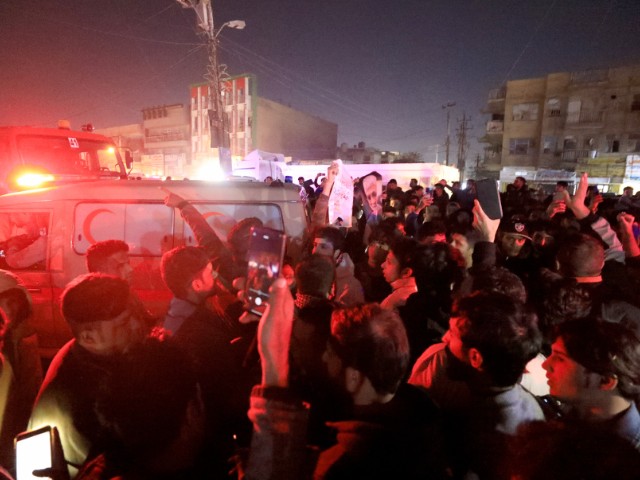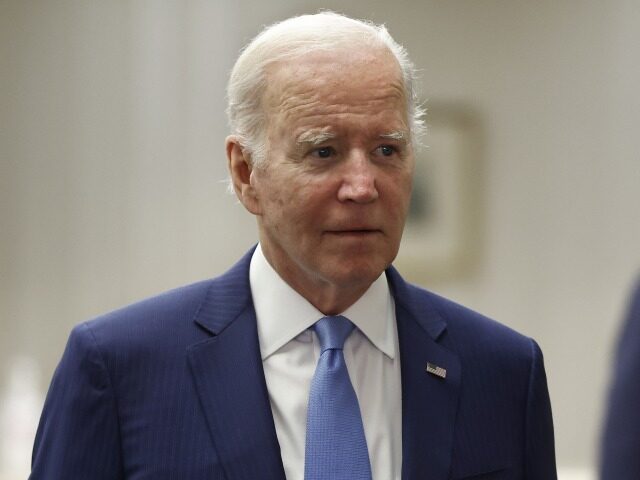The Iraqi government on Thursday condemned U.S. strikes on Iran-backed Shiite militia groups, including Wednesday’s strike that reportedly killed the leader of one of the most powerful militias, Kataib Hezbollah.
The office of Prime Minister Shia al-Sudani said the strikes may push Iraq to ask all American forces to leave the country.
The U.S. launched a round of strikes against Iranian terrorist proxies in Iraq, Syria, and Yemen after a militia drone attack killed three American soldiers at a base in Jordan in late January. The U.S. and U.K. have also struck targets in Yemen in a thus-far unsuccessful attempt to stop the Iran-backed Houthi terrorists from attacking commercial vessels in the Red Sea.
On Wednesday night, a U.S. drone destroyed a car in Baghdad carrying a high-level leader of the Kataib Hezbollah (KH) militia. U.S. officials said the Iraqi government was not notified of the “unilateral” strike in advance.
KH confirmed the target in the car was Abu Baqir al-Saadi, a senior commander in the militia. Iraqi sources said there were two other people in the car when it was struck by a drone-launched missile. U.S. officials said there were no collateral civilian casualties from the attack.
U.S. Central Command (CENTCOM) said the strike that killed al-Saadi eliminated “the commander responsible for directly planning and participating in attacks on U.S. forces in the region.”
“The United States will continue to take necessary action to protect our people. We will not hesitate to hold responsible all those who threaten our forces’ safety,” CENTCOM said.
KH and other Shiite militias were effectively deputized by the Iraqi government to help fight off the Islamic State invasion a decade ago, under the name “Popular Mobilization Forces” (PMF). This technically made militia leaders into officers in Iraq’s paramilitary forces. According to eyewitnesses in Baghdad, the car destroyed by the U.S. drone strike was a PMF vehicle.
Iran’s militia proxies in Iraq also belong to a self-declared organization called the “Islamic Resistance in Iraq” (IRI), which has perpetrated dozens of attacks against American positions since the Israel-Hamas war began in October. The U.S. government named IRI as the culprit behind the deadly attack in Jordan, specifically listing KH as a leading element in the IRI.
KH claimed it would suspend actions against American targets after the Jordan attack, ostensibly to “prevent embarrassment of the Iraqi government.”
The Biden administration pleaded with Baghdad for months to rein in the Shiite militia, to no avail. Instead, angry Iraqi politicians began talking about evicting U.S. troops from the country.
The BBC reported a crowd of protesters gathered around the ruins of the KH commander’s vehicle and chanted “America is the biggest devil.” The crowd prevented journalists from approaching the scene of the strike.

People inspect the vehicle targeted by airstrike in Baghdad, Iraq, on February 07, 2024. At least 3 explosions heard across Iraqi capital Baghdad, local media report (Photo by Murtadha Al-Sudani/Anadolu via Getty Images).
“You are foreigners, and foreigners are to blame for this!” one of the demonstrators told the BBC.
Iraqi military spokesmen denounced the U.S. strike as “clear aggression,” “a violation of Iraqi sovereignty,” and “a blatant assassination … in the heart of a residential neighborhood in the capital.”
Prime Minister al-Sudani’s military spokesman Yahya Rasool said it was “concerning” that the coalition “consistently deviates from the reasons and objectives for its presence on our territory.”
“This trajectory compels the Iraqi government more than ever to terminate the mission of this coalition, which has become a factor for instability and threatens to entangle Iraq in the cycle of conflict,” Rasool said.
Sudani previously called for as “quick” a withdrawal of U.S. forces as possible, without setting a firm deadline. The Pentagon said it had no plans for such a withdrawal.

COMMENTS
Please let us know if you're having issues with commenting.